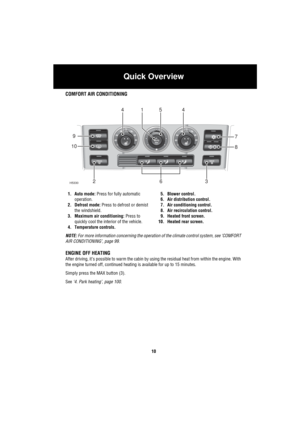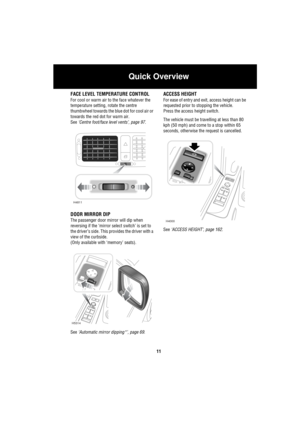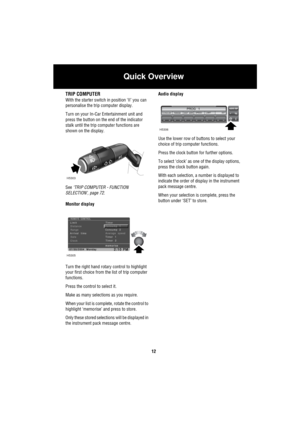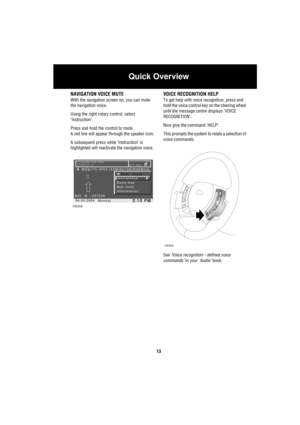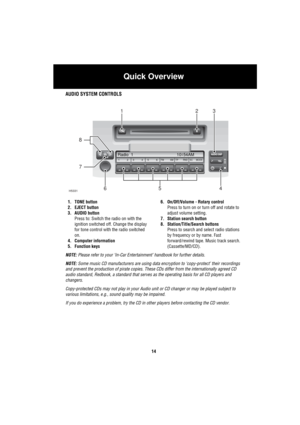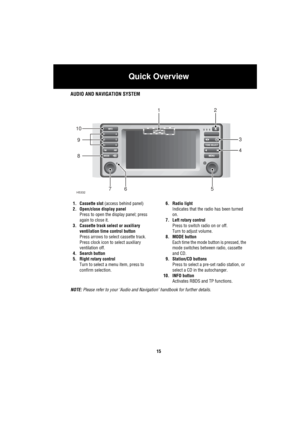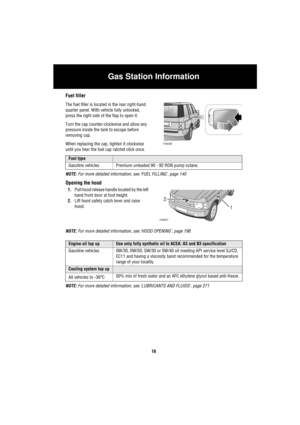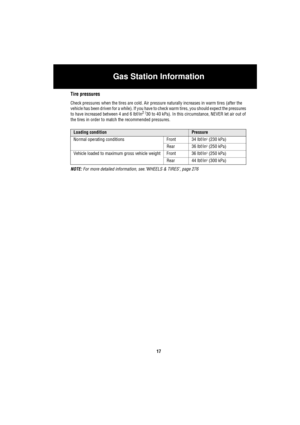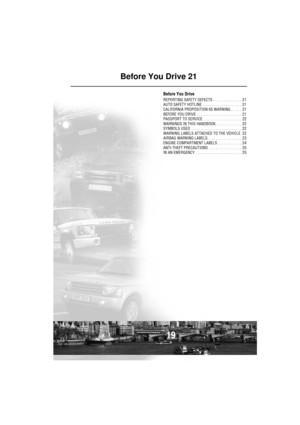Home
>
Land Rover
>
Automobile
>
Land Rover Range Rover 2004my Owners Handbook Lm 2nd Edition Nas Rover
Land Rover Range Rover 2004my Owners Handbook Lm 2nd Edition Nas Rover
Here you can view all the pages of manual Land Rover Range Rover 2004my Owners Handbook Lm 2nd Edition Nas Rover. The Land Rover manuals for Automobile are available online for free. You can easily download all the documents as PDF.
Page 11
Quick Overview 10 COMFORT AIR CONDITIONING 1. Auto mode: Press for fully automatic operation. 2. Defrost mode: Press to defrost or demist the windshield. 3. Maximum air conditioning: Press to quickly cool the interior of the vehicle. 4. Temperature controls. 5. Blower control. 6. Air distribution control. 7. Air conditioning control. 8. Air recirculation control. 9. Heated front screen. 10. Heated rear screen. NOTE: For more information concerning the operation of the climate control system, see...
Page 12
Quick Overview 11 FACE LEVEL TEMPERATURE CONTROL For cool or warm air to the face whatever the temperature setting, rotate the centre thumbwheel towards the blue dot for cool air or towards the red dot for warm air. See ‘Centre foot/face level vents’, page 97. DOOR MIRROR DIP The passenger door mirror will dip when reversing if the ‘mirror select switch’ is set to the driver’s side. This provides the driver with a view of the curbside. (Only available with ‘memory’ seats). See ‘Automatic mirror...
Page 13
Quick Overview 12 TRIP COMPUTER With the starter switch in position ‘II’ you can personalise the trip computer display. Turn on your In-Car Entertainment unit and press the button on the end of the indicator stalk until the trip computer functions are shown on the display. See ‘TRIP COMPUTER - FUNCTION SELECTION’, page 72. Monitor display Turn the right hand rotary control to highlight your first choice from the list of trip computer functions. Press the control to select it. Make as many...
Page 14
Quick Overview 13 NAVIGATION VOICE MUTE With the navigation screen on, you can mute the navigation voice. Using the right rotary control, select ‘Instruction’. Press and hold the control to mute. A red line will appear through the speaker icon. A subsequent press while ‘Instruction’ is highlighted will reactivate the navigation voice. VOICE RECOGNITION HELP To get help with voice recognition, press and hold the voice control key on the steering wheel until the message centre displays ‘VOICE...
Page 15
Quick Overview 14 AUDIO SYSTEM CONTROLS 1. TONE button 2. EJECT button 3. AUDIO button Press to: Switch the radio on with the ignition switched off. Change the display for tone control with the radio switched on. 4. Computer information 5. Function keys6. On/Off/Volume - Rotary control Press to turn on or turn off and rotate to adjust volume setting. 7. Station search button 8. Station/Title/Search buttons Press to search and select radio stations by frequency or by name. Fast forward/rewind tape....
Page 16
Quick Overview 15 AUDIO AND NAVIGATION SYSTEM 1. Cassette slot (access behind panel) 2. Open/close display panel Press to open the display panel; press again to close it. 3. Cassette track select or auxiliary ventilation time control button Press arrows to select cassette track. Press clock icon to select auxiliary ventilation off. 4. Search button 5. Right rotary control Turn to select a menu item, press to confirm selection.6. Radio light Indicates that the radio has been turned on. 7. Left...
Page 17
Gas Station Information 16 Gas Station Information Ga s S ta ti on In fo rm a ti onFuel filler The fuel filler is located in the rear right-hand quarter panel. With vehicle fully unlocked, press the right side of the flap to open it. Turn the cap counter-clockwise and allow any pressure inside the tank to escape before removing cap. When replacing the cap, tighten it clockwise until you hear the fuel cap ratchet click once. NOTE: For more detailed information, see.‘FUEL FILLING’, page 140...
Page 18
Gas Station Information 17 Tire pressures Check pressures when the tires are cold. Air pressure naturally increases in warm tires (after the vehicle has been driven for a while). If you have to check warm tires, you should expect the pressures to have increased between 4 and 6 lbf/in 2 (30 to 40 kPa). In this circumstance, NEVER let air out of the tires in order to match the recommended pressures. NOTE: For more detailed information, see.‘WHEELS & TIRES’, page 276 Loading conditionPressure Normal...
Page 20
19 Before You Drive 21 Before You Drive REPORTING SAFETY DEFECTS . . . . . . . . . . . . . . 21 AUTO SAFETY HOTLINE . . . . . . . . . . . . . . . . . . . 21 CALIFORNIA PROPOSITION 65 WARNING . . . . . 21 BEFORE YOU DRIVE . . . . . . . . . . . . . . . . . . . . . . 21 PASSPORT TO SERVICE . . . . . . . . . . . . . . . . . . . 22 WARNINGS IN THIS HANDBOOK. . . . . . . . . . . . . 22 SYMBOLS USED . . . . . . . . . . . . . . . . . . . . . . . . . 22 WARNING LABELS ATTACHED TO THE VEHICLE 22...
